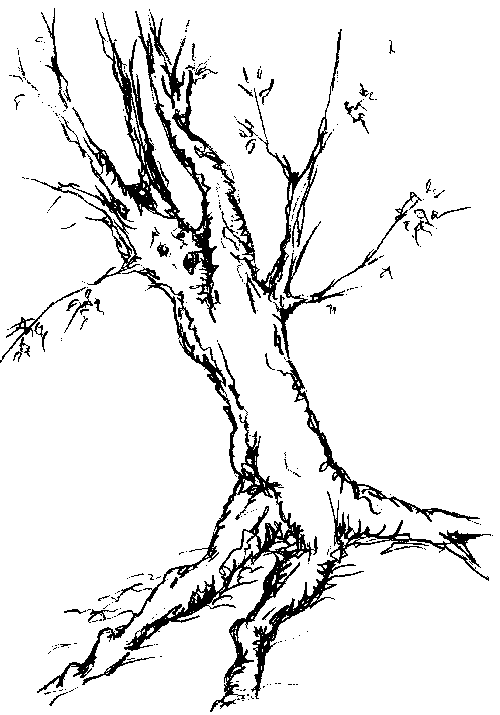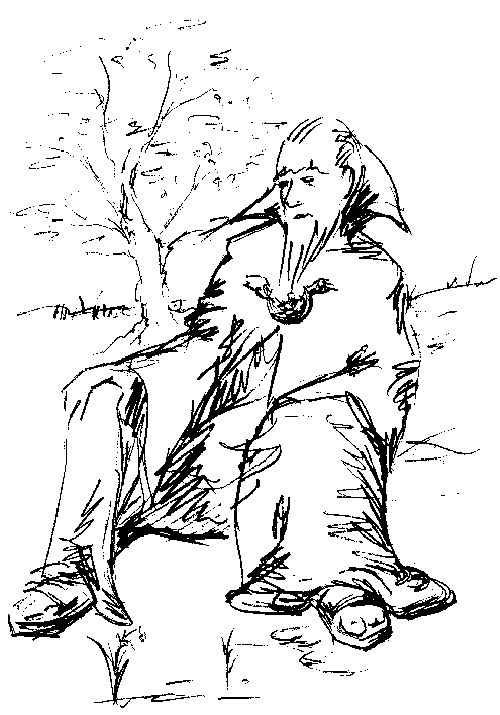 Bottom Bottom |
 Musings Index Musings Index |
 Burning Coal Burning Coal |
This was written during a period of darkness in my soul. Darkness that comes from profound rejection. Like the terror of a child lost in the mall, panic can grip the soul without ever putting on a face or presenting arguements in the court of reason. At such a moment, the fear and the anger of others who are lost, rejected and without love or meaning seems so much more clear.
Normally I would be very angry at this point. Actually I am depressed, sad and contemplative. In this spirit I began writing some of my thoughts on Shakespeare's "The Tempest", which I designed scenery for several years ago.

Ariel the spirit was born to dance on the wind, but cannot move. Year by year, Ariel remains trapped, locked in oak and unable to move a muscle. The sap tracks its way across his skin so slowly. Always Ariel is longing to break free, to fly.
When finally freed from the tree, Ariel is indentured to Prosporo who has freed him. Able to coarse the skies now, he is obliged to remain at the beck and call of his new master.
It would seem that freedom has become such an important feature of modern American thought that it is hard for us to imagine the importance of personal integrity to the Elizabethan world. While Arial kicks hard against the goad, he will not desert his obigation. How many of us can show a similar perseverance now?
Is it hard to understand Ariel's torment? Most of us have dreams and desires that live with us constantly. Visions that we can't bring to fruition become a goad tormenting us in our moments of frustration.
I trained as a theatrical designer (Bach. of Fine Arts, U. of Montana). I love to design. When I see a performance, be it a movie, a play, dance or music, I critique the design. I often think I would do this or that to improve the look. I love it and it is part of who I am.
Unfortunately, and I don't think I'm alone in this, I have chosen several compromizes in life. And of coarse, my particular personality defects, or is it my personal integrity, has disallowed important compromises. The result is that I do very little design now. The frustration is palpable, as I currently work on designs produced for the most part by non-designers. I offer design suggestions carefully and almost never get recognition as a designer.
Where the heart aches, bitterness grows. This is Arial's problem. He is free, but he is not free. His heart aches for flight without boundries, without the call to return. But he won't desert his obligations. His frustration breeds bitterness. That brings him close to the monster Caliban.
Caliban is the embodiment of sloth, greed, lust, pride, envy, : the seven deadly sins.

Prospero is the lord and master. Once he was a great king, now he is exiled to a lonely island. He is no more free than Ariel. His two servants balk and rankle at his barked orders. Both long for freedom. Ariel begs release; the other gruesome monster, Caliban, subverts and cheats. Caliban lusts after the master's one companion, his daughter, and is therefore dangerous as well.
Prospero must be very lonely. He has his daughter, Ariel and Caliban. Ariel wants to be gone, Caliban is a brute. Neither could be called a companion. Miranda, Prospero's lovely daughter, is poorly fleshed out in the play. She is a companion and isn't. A child isn't a companion so much as a beautiful burden. The parent pores out the heart and expects nothing back. The child suckles on the parent's spirit and then must break free. A child cannot be a proper soul mate.
This leads to a darker thought. Alone without the companionship of equals, Prospero becomes slave to a lonely heart. He must truly long for a soul mate. But to expect that from Miranda would make Prospero, the parent, become more perverse than Caliban. So the master must wait, wrapped in an aching heart. Does Prospero fear madness? Does he fear that the loneliness will never go away? Perhaps Prospero fears that his desire for the love of equals will drown his civility and poison the love that he does have.
I am not a king or a statesman, and I am not trapped on a desert isle, and yet I often feel alone. Our world is so full of things. There are so many isms. We are all so full of independance and freedom that genuine connecting is hard to do. Prospero longs to discuss important issues, make important decisions, to be admired by peers, to be loved, to make love.
Life traps us sometimes. Our talents never seem to bear fruit. Our seed is caste, but seems to always land on barren soil. Sometimes I feel as if I had never been loved. It is not true. My parents loved me. Was it too little? Was it a burden of expectation? Did I fear that I could never be what I was supposed to be? Or was it points-off scoring? Starting off a perfect ten, each error took off another point until I could not stand my own failure. I think I just got lost between my older brother and two younger sisters. I was good enough to ignore and not good enough to notice.
I want so much to be good enough to care about. I am deeply offended when my suggestions are passed aside. I am left feeling snubbed. It could have been poor presentation on my part, or an idea that seemed better to me than to the presentees. Most of us, when snubbed, turn haughty, I am no exception, and matters turn worse not better. So we continue doing a pretty good job and feeling so let down and alone.
I have spent my lifetime casting about, trying to discover the secret. I studied many religions and finally came to see that the greatest teaching is the one I fear the most: "Love one another". I have never known how to practice the art properly. The more I love, the more my desire cries out. I struggle in marriage not for wanting too little, but by wanting too much. The blessing is a burden and a curse.
I am the master of ship without a rudder? No one's opinion soothes. I am good enough to ignore, but not good enough to notice. I stand at the wheel wrapped in poisonous longing.